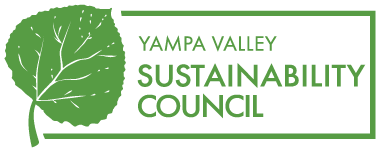JULY 15, 2017 BY
Adapted from the Steamboat Today
When “The Record Company” takes the stage at Howelsen Hill Friday to perform in the third free event of the Steamboat Free Summer Concert Series, one of the regulars in the audience will be missing.
Yampa Valley Sustainability Council Executive Director Sarah B. Jones first acknowledged in a column in Steamboat Today that her organization’s green waste diversion tents — one of the most visible examples of YVSC’s Zero Waste initiative — would not be seen as often at events around town this summer.
Concert-goers had grown accustomed to carrying their paper plates, napkins, beer cups and compostable cutlery to the tent for sorting, and they left with the satisfaction of knowing they had partaken in an event that aspired to the goal of “zero waste.”
What many event-goers may not have understood is how significant the collection of the food waste left on their picnic plates was to the Zero Waste program.
“It’s a big piece of it for sure,” Jones said. “We tried to do all-waste diversion. At most events, the hard part is the food waste.”
The end of food waste composting at Twin Enviro Resources at the landfill west of Milner is the primary factor in the diminished presence of the Zero Waste tents.
Twin Enviro Services CEO Marlin Mullet said the success of year-around, food waste composting at the company’s Milner location was predicated on an effort to build residential and commercial customers for a regular truck route to pick up canisters of food waste and take it to the compost operation. However, after years of trying to make it happen, Twin Enviro realized it wasn’t gaining traction.
The company’s operation here has more than 2,000 accounts for its regular trash and recycling services, but the separate food waste pickup for composting represented less than 1 percent of the total – significantly fewer than 50 accounts split between commercial and residential.
“The ski area generates a huge amount of food waste in winter, and that was by far, our biggest customer,” Mullet said.
In order to service the handful of customers for food waste removal, Twin Enviro had to dispatch a truck and driver, plus pay an employee to wash out the waste containers before they were returned to the customers. It just didn’t make economic sense with so few customers.
“Plain and simple, there’s no demand in this market to collect food waste,” Mullet said.
However, the end of food waste composting does not mean that Twin Enviro has ceased composting altogether. Food waste was just one ingredient in the compost it makes.
The bulk of it is bio-solids from the wastewater treatment plant, which are combined with wood chips that are sourced from wood waste Twin Enviro pulls out of the trash stream and grinds into chips. The bio-solids and wood chips are combined with other ingredients for composting.
Again, Mullett wishes there were more customers for the compost Twin Enviro produces.
And Jones said her organization is preparing to facilitate a task force on food waste recycling to look for options.
“Our goal is to ensure we don’t get caught without having options for recycling of organic waste,” she said.






